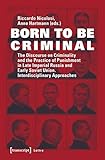Born to be Criminal : The Discourse on Criminality and the Practice of Punishment in Late Imperial Russia and Early Soviet Union. Interdisciplinary Approaches / ed. by Anne Hartmann, Riccardo Nicolosi.
Material type: TextSeries: LettrePublisher: Bielefeld : transcript Verlag, [2017]Copyright date: 2017Description: 1 online resource (252 p.)Content type:
TextSeries: LettrePublisher: Bielefeld : transcript Verlag, [2017]Copyright date: 2017Description: 1 online resource (252 p.)Content type: - 9783839441596
- Crime -- Europe, Eastern
- Criminals -- Soviet Union
- Criminology -- Soviet Union
- Criminality
- Criminology
- Cultural History
- Eastern European History
- Law
- Literary Studies
- Literature
- Medicine
- Slavic Studies
- Social History
- Soviet Union
- LITERARY CRITICISM / European / Eastern (see also Russian & Former Soviet Union)
- Criminality
- Criminology
- Cultural History
- Eastern European History
- Law
- Literary Studies
- Literature
- Medicine
- Slavic Studies
- Social History
- Soviet Union
- 364.947 23
- HV7012 .B67 2017
- HV7012 .B67 2017
- online - DeGruyter
| Item type | Current library | Call number | URL | Status | Notes | Barcode | |
|---|---|---|---|---|---|---|---|
 eBook
eBook
|
Biblioteca "Angelicum" Pont. Univ. S.Tommaso d'Aquino Nuvola online | online - DeGruyter (Browse shelf(Opens below)) | Online access | Not for loan (Accesso limitato) | Accesso per gli utenti autorizzati / Access for authorized users | (dgr)9783839441596 |
Browsing Biblioteca "Angelicum" Pont. Univ. S.Tommaso d'Aquino shelves, Shelving location: Nuvola online Close shelf browser (Hides shelf browser)
Frontmatter -- Content -- Acknowledgements -- Introduction -- I. Inborn Criminality and the Late Russian Empire -- The Empire-Born Criminal -- P. I. Kovalevskii -- Criminality, Deviance, and Anthropological Diversity -- II. On the Treatment of Social Deviance and Criminals in the Late 1920s-early 1930S -- Recidivism, Social Atavism, and State Security in Early Soviet Policing -- Cesare Lombroso and the Social Engineering of Soviet Society -- Concepts of the Criminal in the Discourse of “Perekovka” -- III. Political and ‘Other’ Prisoners – Literature of the Gulag -- Criminals in Gulag Accounts -- Varlam Shalamov’s Sketches of the Criminal World -- On the Contributors -- Backmatter
restricted access online access with authorization star
http://purl.org/coar/access_right/c_16ec
This collection of essays explores the continuities and disruptions in the perceptions of criminality, its causes and ways of fighting it in late imperial Russia and the early Soviet Union. It focuses on both the discourse on criminality and thus the conceptualisation of criminality in various disciplines (criminology, psychiatry, and literature), and penal practice, that is, different aspects of criminal law and anti-crime policy. Thus, the volume is markedly interdisciplinary, with authors representing a variety of approaches in history and literary studies, from social history to discourse analysis, from the history of sciences to text analysis.
Mode of access: Internet via World Wide Web.
In English.
Description based on online resource; title from PDF title page (publisher's Web site, viewed 26. Aug 2024)









